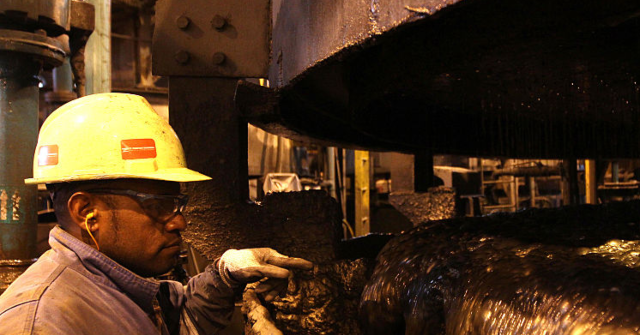The trade deal with Indonesia announced by President Donald Trump on Tuesday will reportedly give the United States access to Indonesia’s vast copper resources, among other benefits.
Copper is in high demand because of its importance to electric vehicles (EVs) and low-carbon energy projects, including solar panels and wind turbines.
“We have full access into Indonesia, everything. As you know, Indonesia is very strong on copper, but we have full access to everything. We will pay no tariffs,” President Trump told reporters on Tuesday.
Trump said his “great deal” with the “highly respected president” of Indonesia, Prabowo Subianto, also included Indonesia promising to buy “$15 billion in U.S. energy, $4.5 billion in American agricultural products, and 50 Boeing jets.”
Trump said Indonesian exports to the United States will pay a 19 percent tariff under the deal, while American exports to Indonesia will face no tariff or non-tariff barriers. If the Indonesians had not made a deal, their tariffs would have risen to 32 percent on August 1.
President Prabowo said his dealings with Trump have opened a “new era of mutual benefit” between the U.S. and Indonesia. He said many details of the seemingly lopsided deal were consistent with Indonesia’s national interests, including the pledge to buy Boeing aircraft.
“I believe there is no problem because we need the aircraft, and they want to sell. Boeing planes are also quite good,” he said.
“I am determined to make Garuda Indonesia bigger, and yes, we need new airplanes for that,” he added. Garuda Indonesia is the national airline. It recently took a $405 million loan from Danantara, one of Indonesia’s sovereign wealth funds, to expand its operations.
“Garuda is our pride and national flag carrier. It was born amid our war of independence. That’s why Garuda must be the symbol of our country,” Prabowo said.
Indonesia’s trade with the United States added up to around $40 billion last year. America’s top imports from Indonesia include palm oil, electronics equipment, footwear, tires, rubber products, and frozen shrimp.
Indonesia is a top global producer of copper with plenty of room for growth, especially if Indonesia develops more smelting and refining capacity. It currently mines over a million metric tons of copper per year, but refines only about 350,000 metric tons.
According to S&P Global’s projections, demand for copper will nearly double over the next ten years, but supply is lagging far behind demand. The U.S. has vast domestic reserves of copper — more than double Indonesia’s proven reserves — but opening new mines in America is extremely difficult due to regulatory barriers. It can take decades for mining companies to secure the permits they need to drill for copper.
President Trump mentioned on Tuesday that Indonesia has “some very valuable earths and various other materials” in addition to copper. One of those materials is nickel, which is also useful to the EV industry.
Indonesia has the world’s largest known reserves of nickel and those reserves are distributed in a way that makes them relatively easy to mine. Unlike with copper, Indonesia has raced to build up processing capacity so it can refine its own nickel instead of exporting raw ore, which is less profitable. Under Prabowo’s predecessor, President Joko Widodo, Indonesia accepted billions of dollars in Chinese investment to develop “downstreaming” or refining its own ore into high-grade nickel products.
Indonesia’s production capacity for nickel consequently increased by 400 percent over the past decade, but not without cost.
The refining capacity China helped Indonesia develop is largely fueled by coal, producing a huge volume of undesirable atmospheric emissions. Huge amounts of land have been environmentally ravaged by the nickel industry, to the great dismay of residents who found themselves drinking contaminated water. Critics of the “green transition” point to Indonesia’s nickel-mining wastelands as another example of electric vehicles inflicting more damage to the environment than they prevent.
Also, Indonesia produced so much nickel that global prices tumbled, forcing many other producers to shut down. Even some of Indonesia’s nickel companies did not survive the price drop they caused.
Given Indonesia’s close alignment with China, this was a troubling outcome for policymakers concerned about China’s dominance of critical minerals production. Those concerns became a hot topic during Prabowo’s presidential election campaign, as his rivals accused him and Joko Widodo of letting China exploit Indonesia’s mineral wealth.
In April 2022, the Indonesian government banned the export of raw nickel ore — an outstanding example of a country using non-tariff barriers to protect a domestic industry. Indonesian officials have credited the ban with increasing their nickel profits by a factor of 20. The Trump administration has cited the raw nickel export ban as an example of the non-tariff trade barriers that Trump’s tariffs were intended to bring down.
The European Union (EU) filed suit with the World Trade Organization (WTO) against Indonesia for violating its trade agreements with the raw nickel ban. The Indonesian government expressed irritation at the EU lawsuit for violating its sovereign right to develop its natural resources. The U.S. supports the EU lawsuit, and has also criticized Indonesia’s nickel industry for employing forced labor.
Although Trump and Prabowo did not talk about the nickel industry on Tuesday, Indonesian diplomatic sources said last week that the ban on exporting raw nickel to the United States could be lifted as part of a trade deal.
Read the full article here


